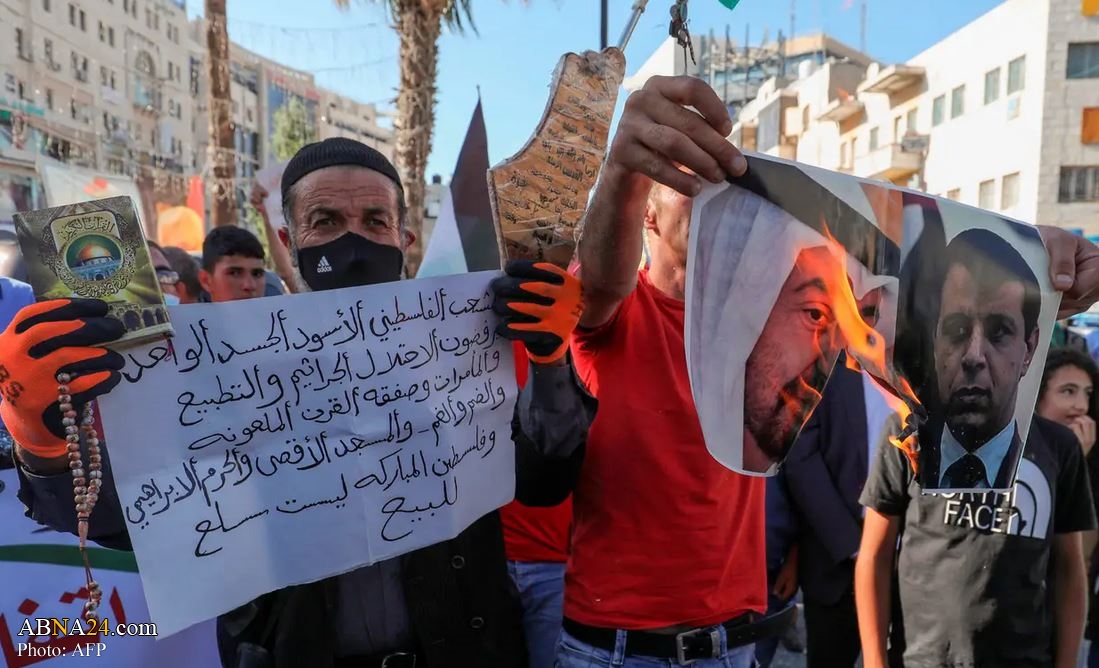AhlulBayt News Agency (ABNA): On Saturday, Emirates Leaks whistleblower website, citing informed sources, reported that Abu Dhabi was trying to foist Mohammed Dahlan on the upcoming Palestinian general elections. Dahlan is Fatah’s defected senior official and is the current advisor to the UAE Crown Prince Mohammed bin Zayed.
The outlet said that the UAE has started massive campaign to impose Dahlan on President Mahmoud Abbas of the Palestinian Authority and his party Fatah.
The efforts are seen as the UAE’s preparation to meddle in the Palestinian developments as Palestine is planning to hold parliamentary and presidential elections this year after 14 years.
Scenario to ditch Abbas
Definitely an important goal of Abu Dhabi's new political endeavor to influence the developments in Palestine on the eve of the elections— Palestinian Legislative Council elections on May 22, and presidential elections and Palestinian National Council on August 31—, is to oust Mahmoud Abbas from Palestinian Authority and Fatah Movement’s leadership. Last year when the UAE and then Bahrain announced normalization of relations with the Israeli regime, Abbas, who saw his position as the advancer of the rights of the Palestinians at stake, did not yield to the UAE and Bahrain’s pressures which already betrayed the Palestinian cause.
In the new conditions, the key to the UAE's foreign policy on the Palestinian issue is Dahlan, who acts as an adviser to bin Zayed. Dahlan was born in Khan Yunis and was previously the head of the Fatah security organization in Gaza. He has been in exile in Abu Dhabi since 2011. He has close ties to the Al-Nahyan royal family and enjoys the support of the Egyptian government. The former Fatah official is said to have had a major influence on the Crown Prince's decisions on the Palestinian issues. The return of Dahlan to the Palestinian territories to replace Mahmoud Abbas would be an ideal situation for Abu Dhabi.
In both Gaza and the West Bank, speculation about the facilitating role of Dahlan in the normalization agreement is widespread. However, he strongly denied having such a role, but his refusal to condemn the deal has raised suspicions. He also spoke about the normalization agreement and defended the UAE action.
"The UAE did its best to put direct pressure on the US government and other parties to end the plan to annex the settlements and Trump's peace plan and implement the UN resolutions and the Arab peace initiative of 2002,” he said after accusations of treason.
Nabil Shaath, a senior Fatah official who acts also as Abbas advisor, said Dahlan was part of the "engineering body" of the Abraham Accords, the American name for the Arab-Israeli normalization agreement. Adnan al-Dumiri, a spokesman for the Palestinian security services in Ramallah, also told France 24 that "we are sure [Dahlan] was an accomplice and supporter of normalization." Hamas also agrees with these views.
Therefore, looking at the strong anti-Emirati sentiments among all Palestinians, the UAE is trying to bring Dahlan to the West Bank to plant its influence in the Palestinian politics. Abu Dhabi is aware that the US and the Israeli regime also support this controversial figure. Earlier, Washington's ambassador to Tel Aviv, David Friedman, told the Israeli newspaper Hayum that the US saw Dahlan as a possible rival to the Palestinian president.
Authoritarian stability strategy and hostility to Muslim Brotherhood
Another goal of bin Zayed in supporting Dahlan is driven by his antipathy to the Muslim Brotherhood, an Islamist political movement that seeks power across the Arab world. Bin Zayed does not support the establishment of an independent Palestinian state in principle and most likely does not believe that the Palestinians can have a state in the future. However, the top decision-maker is trying to influence the Palestinian affairs under the framework of Abu Dhabi's agenda to eradicate the Muslim Brotherhood forces from the Arab region and counter the influence of the UAE's enemies.
One of the main reasons that bin Zayed is very close to Dahlan is his security record in Gaza. On his orders, hundreds of Hamas members were arrested and tortured between 2000 and 2010.
Bin Zayed seeks to use Dahlan as a lever to force down the Turkish and Qatari influence in the region. Dahlan has repeatedly spoken harshly against Qatar. This means that if he assumes the power, the West Bank and Gaza will lean to Abu Dhabi in terms of asking for humanitarian aids and also political loyalty.
About Turkey, the situation is the same. The Turkish government, which accuses Dahlan of having role in plotting the failed July 15, 2016 coup against President Recept Tayyip Erdogan, has placed him on a wanted list and offered a $700,000 reward for information leading to his capture. Ankara also believes Dahlan was involved in a 2013 UAE and Saudi-backed coup against Egyptian President Mohamed Morsi, the Muslim Brotherhood-affiliated leader who was ousted only a year after his election.
Therefore, it can be said that Dahlan is a Palestinian who is instrumental for the UAE’s push for a Brotherhood-free region. With this plan on the Emirati agenda, other anti-Brotherhood countries like Saudi Arabia and Egypt will quickly support the scenario to replace Abbas with Dahlan.
/129

